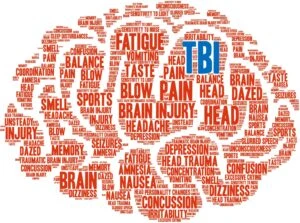
A Traumatic Brain Injury (TBI) is commonly suffered by a person who experiences a considerably large impact or collision to the head, neck, or spine. Such an impact can cause damage to the brain and ultimately cause moderate to severe implications. Typically, Traumatic Brain Injuries occur following a severe head impact resulting in the brain hitting the inner wall of the skull, bruising the delicate soft tissue. On some occasions, a severe TBI may be caused as the result of direct penetration of the skull and brain tissue.
The Centers for Disease Control and Prevention, who publish data on Traumatic Brain Injuries in the United States, reported that in 2014, there were about 2.87 million Traumatic Brain Injury related emergency room visits, hospitalizations, and deaths. Unfortunately, Traumatic Brain Injuries are not uncommon in Florida. It is important to note, however, that not all jolts or impacts to the head will result in a TBI, and not all Traumatic Brain Injuries will result in permanent, long-term brain damage or head injuries.
Some Traumatic Brain Injuries will result in temporary or short-term problems with normal brain function. For example, they may include a person experiencing problems with the way that they think, move, communicate, act, and understand. However, moderate or severe TBI may result in long-lasting disability, and sometimes even death.
If you have suffered from a Traumatic Brain Injury (TBI), contact The Law Place in Florida today. Our legal team has a wealth of experience handling Traumatic Brain Injury cases, and we can inform you of what they commonly involve.
Furthermore, if you or someone you know has suffered a Traumatic Brain Injury, you may be entitled to compensation. The implications of such an injury can be moderate to severe; we can help you win the justice that you deserve for your pain and suffering. Contact us today for a free consultation, we are available 24 hours a day, seven days a week. Call us on (941) 444-4444.
What Types of Head Injuries Are There?
Traumatic Brain Injuries are very serious as the brain is an incredibly complex organ and extremely fragile. A person who suffers a head injury may initially be unaware that they have suffered a Traumatic Brain Injury, and this is why at The Law Place, we highly recommend that you seek medical attention immediately after suffering a head injury. Your head injury may seem minor, but the damage to your brain tissue could have long-term implications for you.
Some injuries suffered are referred to as primary, meaning that the damage to the head and brain is immediate. Other consequences of a TBI can be referred to as secondary, meaning that they can gradually occur over the days, weeks, or even years following a person suffering a head injury. There are two main types of head injuries, penetrating and non-penetrating.
- Penetrating TBI – Penetrating (also referred to as open TBI) occurs when an object penetrates the skull and enters the brain tissue. These objects may include bullets, shrapnel, or weapons such as a knife. This type of Traumatic Brain Injury will usually damage only part of the brain.
- Non-Penetrating TBI – Non-penetrating (also referred to as blunt TBI or closed head injury) is commonly caused by an external force to the head, causing the brain to move within the skull. A Traumatic Brain Injury of this type will usually be caused by a fall, a motor vehicle crash, being struck by an object, or sports injury. The Centers for Disease Control and Prevention have reported that in 2014, falls were the leading cause of a Traumatic Brain Injury. Being struck by an object or against an object was the second leading cause.
Regardless of the type of Traumatic Brain Injury suffered, the implications of such an injury can be moderate to severe and massively alter a person’s life forever. Whenever the brain is damaged, there is a great risk of moderate or severe consequences as the brain is the most complex organ in the human body. That is why The Law Place in Florida recommends that if you or someone you know has suffered a Traumatic Brain Injury that you seek medical attention immediately. The long-term implications of such an injury can be debilitating, so it is always in the best interest to get a doctor to check out your head injury, even if it seems minor.

What Are the Most Common Causes of Traumatic Brain Injury?
Most people are unaware of just how easy it can be to suffer a brain injury. Brain injuries can be suffered almost anywhere, doing nearly any kind of activity. You could suffer a Traumatic Brain Injury in your house, car, public space, or office. The most common causes of Traumatic Brain Injuries include:
- Falls and Being Struck by Objects – Falls are the most common cause of people suffering damage to their brain and other head injuries. Falls are typically caused by slipping and falling on wet surfaces, tripping and falling on uneven floor surfaces, defective stairs, and workplace accidents. Falling objects coming into contact with someone’s head also causes a high percentage of all brain injuries. These types of accidents commonly occur in supermarkets with overstocked shelves, construction tools falling or being dropped through unsafe scaffolding and furniture or equipment which isn’t secured falling on top of young children.
- Motor-Vehicle Accidents – The Centers for Disease Control and Prevention have reported that in 2014, 20 percent of all TBI-related hospitalizations were the result of motor vehicle accidents. Some of these accidents may involve cars, trucks, bicycles, motorbikes, and electric scooters. However, cyclists, motorcyclists, electric scooter riders, skateboarders, and pedestrians are at a greater risk of suffering a Traumatic Brain Injury in an accident because they have very little protection from the impact. Motor vehicle accidents can cause considerable damage and are incredibly dangerous.
- Medical Malpractice – The negligence of surgeons and other healthcare practitioners can also be responsible for a considerable amount of Traumatic Brain Injuries every year in the United States. Some examples of malpractice include medication errors, birth injuries, surgical errors, negligent supervision, and negligently maintained hospital rooms.
- Acts of Violence – Violent acts are responsible for about eleven percent of all Traumatic Brain Injury cases reported each year. Such acts could involve a punch or kick to the head, shoving, or the use of some type of weapon. The use of weapons can be incredibly dangerous as the chances of suffering a penetrating TBI is far greater.
 We’re here to serve you. Our phones are open 24 hours a day.
We’re here to serve you. Our phones are open 24 hours a day. Can You Recover From Traumatic Brain Injury?
If you have suffered a minor Traumatic Brain Injury, you are likely to recover from your injuries in the following months after your accident and will likely be able to return to your normal life.
However, if you have suffered a moderate or severe Traumatic Brain Injury, the likelihood is that the effects of such an injury may be long-lasting. It can still be possible to recover from such an injury, and rehabilitation would be available, most people who suffer a severe TBI will have their lives altered forever and will be forced to adapt and adjust to their new reality.
After suffering a Traumatic Brain injury, the fastest improvement in a patient’s condition will usually occur in the first six months following the injury, although the rate of recovery does differ between people. The most serious brain injuries will require specialized hospital care and months of rehabilitation. However, most of the time, Traumatic Brain Injuries are mild and can be managed with either a short-stay at the hospital or at-home monitoring.
If you have any further questions or queries concerning whether you can recover from a Traumatic Brain Injury, contact The Law Place today. One of our brain injury lawyers will be able to use their past experience in handling Traumatic brain injury cases to try their best to answer any questions you may have.
If you or someone you know has suffered a Traumatic Brain Injury and you are thinking of filing a claim, contact our law firm today for a free consultation. One of our accident attorneys will be able to give you the help and legal guidance you may be seeking. At The Law Place, our clients are our number one priority, and we strive to ensure that they win the justice that they both deserve and are entitled to.
 We’re Florida’s top litigation team with over 75 years of combined experience
We’re Florida’s top litigation team with over 75 years of combined experience What Abnormal States of Consciousness Can a TBI Result In?
A person who suffers a severe Traumatic Brain Injury risks suffering an abnormal state of consciousness. There are five abnormal states of consciousness that a person can experience if they suffer an injury to the brain, and they are:
- Stupor – In this state, a person is unresponsive but can be briefly aroused through a strong stimulus. For example, they may briefly react to pain.
- Coma – A person who is in a coma is completely unconscious. They are unaware and unable to react to a stimulus for more than 24 hours.
- Vegetative State – A person in a vegetative state is unconscious, unaware, and unresponsive to factors such as light and pain. However, a person in this state may have sleep and wake cycles and may often have reflective responses. A person may also open their eyes and/ or groan.
- Persistent Vegetative State – If a person has been in a vegetative state of unconsciousness for more than 30 days, then they are considered to be in a persistent vegetative state. It can be incredibly critical for a person in this abnormal state of consciousness. An adult in a persistent vegetative state has a chance of 50 percent of recovering within the first six months of them being in that state. Children in a persistent vegetative state have a 60 percent chance of making a recovery in the first six months. Unfortunately, the longer a person is in a persistent vegetative state, the less the chance of them recovering properly, if at all.
- Locked-in Syndrome – This is a condition that results in damage to portions of a person’s lower part of their brain and brain stem. This damage can cause a person to be fully awake and aware of their surroundings but unable to move due to the complete paralysis of their body. A lot of patients who suffer from locked-in syndrome can communicate through eye movement, such as blinking, as the eyes are the one part of the body that does not get affected by paralysis.
It can be upsetting to see a person in an abnormal state of consciousness caused by a Traumatic Brain Injury. However, it is important to remember that people can recover from these states.
If you or someone you know has suffered a Traumatic Brain Injury that has resulted in you being an abnormal state of consciousness, you can be entitled to claim for your injury and trauma experienced. An accident attorney at The Law Place will be able to help you achieve the justice that you may be entitled to.
 From the initial call to updates on your case status, we are here to get you answers.
From the initial call to updates on your case status, we are here to get you answers. What Are the Long-Term Effects of a Traumatic Brain Injury?
Over 80 percent of people who suffer a mild Traumatic Brain Injury will recover quickly and not experience any long-term effects. However, less than 20 percent of patients who have suffered a Traumatic Brain Injury may have to face some longer-lasting symptoms and problems.
Moderate to severe TBI can cause a person to suffer a physical or mental disability. Even if the person appears to recover from their brain injury, they may likely face some of the symptoms for the rest of their life.
Patients who suffer a severe TBI could potentially experience motor deficits as a result of the damage caused to the brain. The patient’s movement or motor skills could be damaged. Examples of motor deficits and disabilities caused by serious Traumatic Brain Injury may include:
- Paralysis.
- Loss of fine motor skills.
- Muscle stiffness or uncontrolled movements.
- Vision problems.
- Difficulty thinking and remembering.
- Problems talking, walking, or swallowing.
There are other long-term symptoms of Traumatic Brain Injuries, which can make recovery a lengthy process. It is important to note that the severity and duration of these symptoms will depend on the patient and the severity of the injury, but it is possible to recover from some of these symptoms. Some of the symptoms can include:
- Physical Effects – These can include sleeping disorders, loss of stamina, chronic pain, seizures, physical paralysis, appetite changes, hormonal changes, difficulty regulating body temperature, and difficultly swallowing.
- Cognitive Effects – These can include memory problems, impulsiveness, distractibility, difficulty with concentration, confusion, slow speed of processing, and difficulty with language processing.
- Effects on Vision – These can include total or partial loss of vision, diplopia, blurred vision, photophobia, involuntary eye movements, and problems judging distance.
- Speech and Language Effects – These can include slurred speech, problems with reading comprehension, aphasia, and speaking very fast or very slow.
- Effects on Hearing – These can include a loss or decrease of hearing, tinnitus, and increased sensitivity or intolerance to sounds.
- Sensory and Perceptual Effects – These can include difficulty perceiving temperature, difficulty with fine discrimination, difficulty distinguishing between touch and pressure sensations, difficulty perceiving movement and positions of the arms and legs, and difficultly integrating and understanding the information gained through the five senses.
- Social-Emotional or Behavioral Effects – These can include dependant behaviors, lack of motivation, fluctuating emotions, Irritability, depression, aggression, lack of inhibition, and denial or lack of awareness.
How Long Do TBI Symptoms Last?
The most common symptom of a Traumatic Brain Injury is known as post-concussion syndrome. Most people who suffer a Traumatic Brain Injury will begin to show signs of the syndrome in the following three months after the accident has occurred. These concussion symptoms are part of the recovery period and typically are not signs of further medical complications or damage to the brain.
Post-concussion syndrome is more common after a person has suffered a mild Traumatic Brain Injury, rather than a moderate to severe TBI. Commonly, most people who suffer a TBI will not experience these symptoms until days or even weeks after their accident, but they can be felt sooner. These symptoms do tend to go away, eventually without any specialist treatment.
Some of the symptoms which could suggest you have a concussion after suffering a mild Traumatic Brain Injury can include:
- Poor concentration.
- Tiredness.
- Irritability.
- Memory problems.
- Headaches.
- Sensitivity to bright light.
- Double or blurred vision.
- Trouble thinking.
If you have not suffered a severe TBI, the symptoms of a mild Traumatic Brain Injury will usually recover in the first three months after suffering the injury. Most people will be fully recovered and back to normal, with their symptoms gone six months after suffering the injury. It is important to note that if you have suffered a more moderate or severe TBI, the symptoms could last much longer.
Not everyone will recover from the symptoms of a Traumatic Brain Injury at the same rate. For example, people under the age of 40 are likely to recover faster and experience fewer symptoms if they have suffered a mild Traumatic Brain Injury. Although, older people are likely to have their symptoms last a lot longer as their recovery is much slower. If you are an older person who has suffered a mild Traumatic Brain Injury, you should expect your full recovery to take between six to twelve months.
Symptoms of a Traumatic Brain Injury are likely to last a lot longer if a person doesn’t get an adequate amount of rest after suffering the injury. People who swiftly return back to work, exercise, family responsibilities, and social activities after suffering a Traumatic Brain Injury are at risk of not only causing further injury to themselves but also delaying their recovery period.
What Medications Can Be Used to Treat People Suffering From TBI?
The medications that a doctor can prescribe to a person suffering from a TBI will very much depend on their condition. Although some of the more commonly prescribed medications for people suffering from TBI include the following:
- Anticoagulants to prevent blood clots.
- Anticonvulsants to prevent seizures.
- Muscle relaxants to relieve spasticity.
- Stimulants to increase a TBI patient’s ability to remain alert.
- Analgesics for pain management.
- Antidepressants to alleviate depression that is commonly experienced by patients suffering from TBI.
Navigating TBI Claims with The Law Place
After suffering a traumatic brain injury (TBI) due to someone else’s negligence, the path to recovery can be daunting, both medically and legally. The Law Place is here to guide you through this challenging time, offering comprehensive legal support to ensure you receive the justice and compensation you deserve.
Understanding Your Rights
Our team begins by helping you understand your rights following a TBI. We explain the legal options available to you and the potential for recovering compensation for medical bills, lost wages, and other damages resulting from the injury.
Gathering Evidence
Proving negligence in TBI cases requires meticulous evidence gathering. The Law Place conducts thorough investigations to collect medical records, accident reports, and expert testimonies. Our aim is to build a strong case file that demonstrates the extent of your injuries and the impact they have on your life.
Assessing the Full Impact of Your Injury
TBIs can have far-reaching effects on your health, employment, and quality of life. We work with medical professionals to assess the full scope of your traumatic brain injury symptoms and future needs, including ongoing therapies, rehabilitation, and any necessary adjustments to your living situation.
Negotiating with Insurance Companies
Dealing with insurance companies can be overwhelming, especially when recovering from a TBI. Our team handles all communications and negotiations on your behalf, advocating for fair compensation that reflects the severity of your injuries and the negligence of the liable party.
Legal Representation in Court
If a fair settlement cannot be reached through negotiations, The Law Place is prepared to represent you in court. We present your case with clarity and conviction, aiming to secure the compensation you need to support your recovery and future well-being.
Compassionate Support Throughout the Process
At The Law Place, we understand the emotional and physical toll a TBI can take on individuals and their families. We offer compassionate support throughout the legal process, ensuring you feel informed and empowered at every step.
If you or a loved one has suffered a TBI due to someone else’s negligence, The Law Place is ready to help. Our team is committed to providing the guidance and representation you need to navigate the aftermath of a TBI, working tirelessly to secure the compensation and justice you deserve. Contact us today for a consultation and take the first step towards recovery and resolution.
Is a TBI Permanent? FAQ
Can a traumatic brain injury (TBI) lead to permanent effects?
The permanence of a traumatic brain injury (TBI) largely depends on the severity of the injury and the effectiveness of the treatment received. While mild traumatic brain injuries (mild TBI) may result in symptoms that resolve over time with proper care, moderate traumatic brain injury and severe brain injury can lead to long-term or even permanent brain damage.
What factors influence the permanence of TBI effects?
Several factors can influence whether a TBI will have permanent effects, including the location and extent of the brain cells damaged, the immediate treatment received, and the individual’s overall health. Additionally, the presence of a diffuse axonal injury or a secondary brain injury, such as those caused by reduced blood flow or increased pressure within the skull, can complicate recovery and increase the likelihood of lasting damage.
What are the common long-term symptoms of TBI?
Traumatic brain injury symptoms that may persist long-term or become permanent include cognitive impairments, memory loss, difficulty concentrating, mood swings, and changes in personality. Physical challenges may also persist, such as chronic headaches, dizziness, and fatigue. In cases of severe injury, individuals may experience significant impairments requiring ongoing speech therapy and physical therapy.
How is the severity of a TBI determined?
The severity of a TBI is typically assessed using various diagnostic tools, including magnetic resonance imaging (MRI) scans, which can provide detailed images of the brain to identify injuries and assess their severity. The patient’s symptoms and the duration of consciousness loss or memory loss immediately following the injury are also critical factors in determining the injury’s severity.
Can rehabilitation therapies help with recovery from TBI?
Yes, rehabilitation therapies, such as physical therapy and speech therapy, play a crucial role in the recovery process for many individuals with TBI. These therapies can help improve physical function, speech, and cognitive abilities. While rehabilitation can significantly aid recovery, the extent of improvement varies from person to person, and some may continue to experience symptoms or limitations.
Is there a way to prevent permanent brain damage after a TBI?
Early and aggressive treatment following a TBI can help minimize the risk of permanent brain damage. This includes prompt medical attention to address any secondary brain injury factors, such as issues with blood flow or swelling, and tailored rehabilitation programs to support recovery. However, despite the best efforts, some TBIs may still result in permanent impairments.
What should I do if I or someone I know is experiencing TBI symptoms?
If you or someone you know is experiencing symptoms of a traumatic brain injury, it’s crucial to seek medical attention immediately. Early diagnosis and treatment are vital for the best possible outcome. For those dealing with the aftermath of a TBI, especially if it was caused by someone else’s negligence, consulting with a legal professional experienced in handling such cases can provide guidance on pursuing compensation for medical expenses, lost wages, and other related costs.
The Law Place
If you have further queries concerning TBI, contact The Law Place in Florida today. One of our experienced accident lawyers can give you all the help and legal guidance you may be seeking. If you or someone you know has suffered a TBI, you could be entitled to compensation.
Our legal team has successfully achieved compensation for our clients who have suffered injuries to the brain before, and therefore, you can be assured that your case will be in very capable hands.
Call us today to schedule a free consultation on (941) 444-4444.



